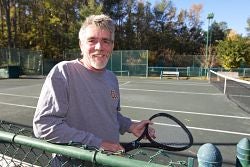John Anema checks off doctoral degree from his bucket list
John Anema’s bucket list may seem ordinary to some. There’s no faraway vacation or extreme sport. Spending time with family and friends tops his “to do” list, which got a little shorter in October.
That’s when Anema, who is battling lung cancer that has spread to his brain, defended his dissertation for a doctoral degree in rehabilitation studies from East Carolina University. He graduates Dec. 16 and will be hooded by Dr. Paul Alston, former longtime chair of the department.

John Anema enjoys tennis almost daily at Baywood Racquet Club. Photo by Cliff Hollis, ECU News Services.
“I looked at my life, and wanted to see what I might regret (not doing), and getting my Ph.D. was one of those,” said Anema, 64. “It came more to the forefront when I was diagnosed.”
His prognosis uncertain, he began prioritizing the things he wanted to do and the things he had to do, he said.
He met with Dr. Paul Gemperline, dean of ECU’s graduate school, to talk about his options. Gemperline steered him toward research he had already started as a counselor. Dr. Steven Sligar, associate professor of rehabilitation studies, was on his dissertation committee.
“I’m indebted to Dr. Sligar,” Anema said. “My committee support has been unwavering.”
A lifetime of service
After college, Anema was drafted in the Army, where he helped set up a drug treatment program for veterans who became addicted to heroin in Vietnam. He also had a keen interest in post traumatic stress disorder, being a veteran himself.
He served about 18 months before receiving a medical discharge for Crohn’s disease. He returned to Greenville, working in Kinston as coordinator of a substance abuse treatment program, then as a rehabilitation counselor for 23 years with the Pitt County Mental Health Center. He took early retirement and set up his own practice, Creative Life Solutions.
His services range from working with veterans with PTSD, to individuals with clinical depression, to counseling workers in employee assistance programs. In that role, he helps employees who have personal problems that interfere with their workplace performance. “I help them develop a plan to deal with what’s going on in their life,” he said. “It’s one of the most rewarding jobs I’ve ever had.”
He dedicated his doctoral research – evaluating the effectiveness of an employee assistance program for people with disabilities – to anyone who has had cancer. “We’re never alone because so many people have had cancer,” he said. “I don’t feel sorry for myself. I don’t feel like this is unique to me.”
Never give up
When his lung cancer was diagnosed in March last year, doctors recommended removing half his right lung, until discovering the cancer metastasized to his brain. Anema doesn’t smoke. “I haven’t had a cigarette since 1972,” he said. “There is a stigma that is bothersome. People think it’s something that is self-inflicted. But lung cancer is not just for smokers.”
Anema read in cancer survivor Lance Armstrong’s book that the single most important thing is to get a second opinion, which he firmly supports. “There are so many types of treatment out there. There are so many clinical trials. It doesn’t mean there is a cure for everything. You must be realistic with the odds but you still have a responsibility for living your life. The worst thing people can do is give up living,” Anema said.
He has been treated with the CyberKnife, a non-surgical alternative that delivers high doses of radiation to tumors, and a new oral chemotherapy that attacks the protein matter of bad cancer cells and prevents them from spreading while allowing Anema’s immune system to fight the cancer. He said the oral chemo has given him a better quality of life despite the disease.
With traditional chemotherapy, the prognosis was 50 percent mortality in the first year. With the oral chemo, 25 percent of people are still taking it five years later. “Otherwise, my chances of surviving five years were about 1 percent,” he said.
One doctor described lung cancer as “the I-95 of cancers. It moves. It’s the most lethal of different types of cancers,” he said. Right now, his lung tumor is about half the size it was when he started treatment and no new brain tumors have been detected.
Living with cancer
Anema’s father died of pancreatic cancer in March 2000. Anema was able to spend time with him as he battled the disease. “He said you could be mad, depressed, frustrated, but if you stay that way, you’re wasting valuable time,” Anema said.
For him, it’s not the amount of time he has left but what he does with that time. “I try to do something fun every day,” he said.
In looking back on his career, Anema said: “The things I’ve done have been rewarding to me because I’ve been able to help other people. It’s a real source of satisfaction to me.”
He received the 1991 Distinguished Service Award from ECU for his volunteer work with honors high school students in the College Bowl. The award is one of the most prestigious given by the university to a graduate to recognize uncommon and outstanding service.